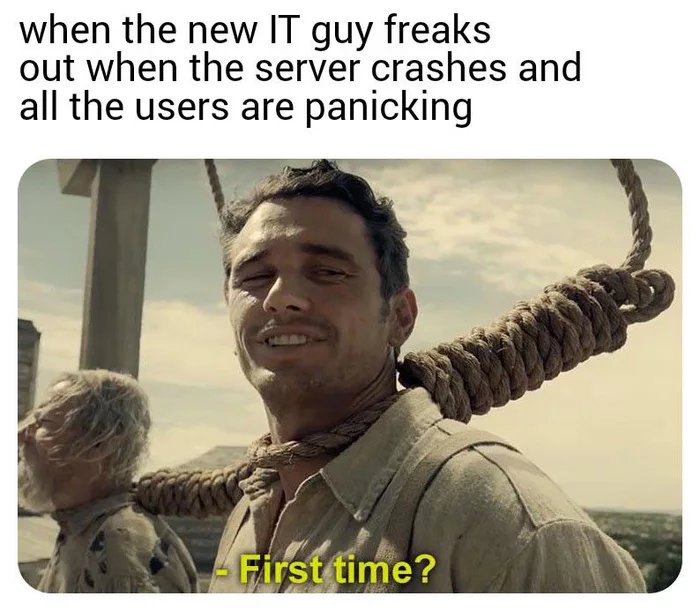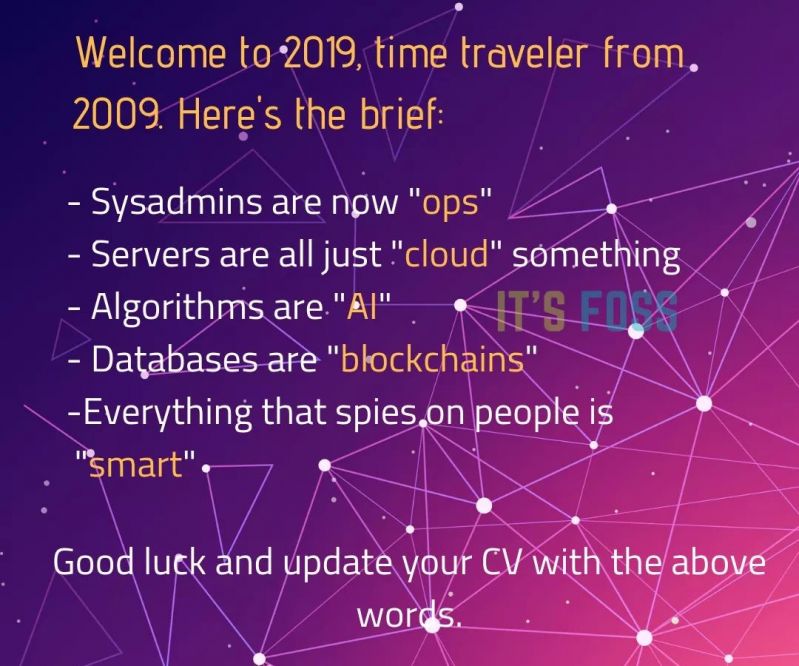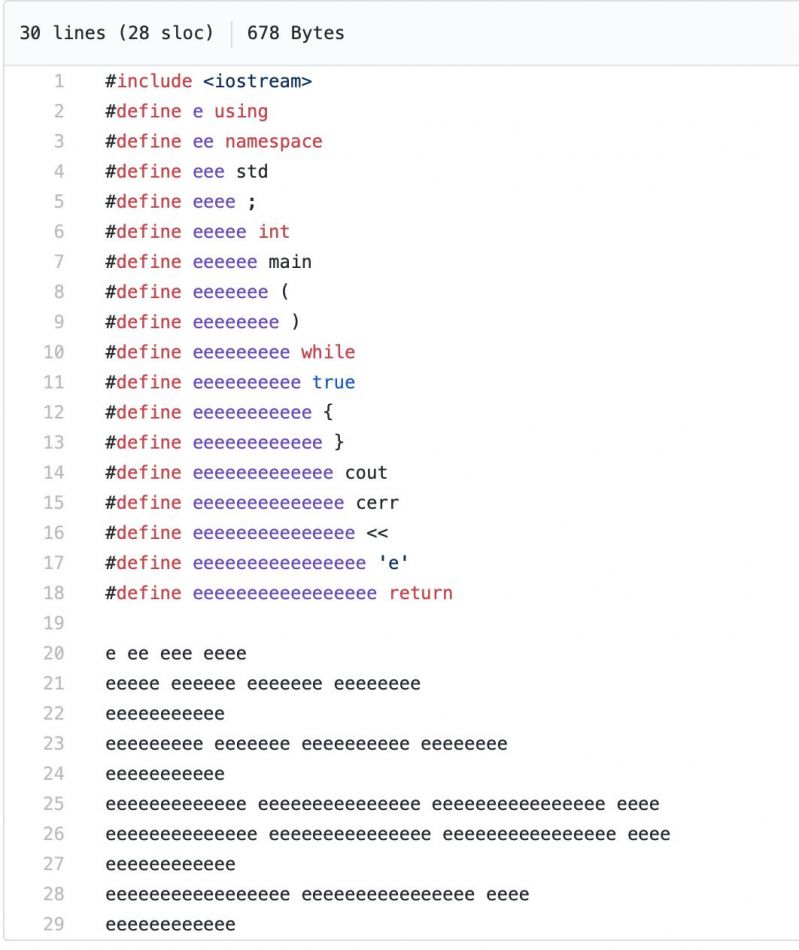Details
Joined devRant on 5/8/2017
Join devRant
Do all the things like
++ or -- rants, post your own rants, comment on others' rants and build your customized dev avatar
Sign Up
Pipeless API

From the creators of devRant, Pipeless lets you power real-time personalized recommendations and activity feeds using a simple API
Learn More
-
!rant
I personally a book worm I read books from goalkicker.com , I started programme for Android application in Java. -
I turned 40 yesterday. Here are some lessons I've learned, without fluff or BS.
1) Stop waiting for exceptional things to just happen. They rarely do, and they can't be counted on. Greatness is cultivated; it's a gradual process and it won't come without effort.
2) Jealousy is a monster that destroys everything in it's path. It's absolutely useless, except to remind us there's a better way. We can't always control how we feel, but we can choose how we react to those feelings.
When I was younger, jealousy in relationships always led to shit turning out worse than it probably would have otherwise. Even when it was justified, even when a relationship was over, jealousy led me to burn bridges that I wished I hadn't.
3) College isn't for everyone, but you'll rarely be put square in the middle of so much potential experience. You'll meet people you probably wouldn't have otherwise, and as you eventually pursue your major, you'll get to know people who share your passions and dreams. Despite all the bullshit ways in which college sucks, it's still a pretty unique path on the way to adulthood. But on that note...
4) Learn to manage your money. It's way too easy to get into unsustainable debt. It only gets worse, and it makes everything harder. We don't always see the consequence of credit cards and loans when we're young, because the future seems so distant and undecided. But that debt isn't going anywhere... Try not to borrow money that you can't imagine yourself paying back now.
5) Floss every day, not just a couple times per week when you remember, or when you've got something stuck in your teeth. It matters, even if you're in your 20s and you've never had a cavity.
6) You'll always hear about living in the moment, seizing the day... It's tough to actually do. But there's something to be said for looking inward, and trying to recognize when too much of our attention is focused elsewhere. Constantly serving the future won't always pay off, at least not in the ways we think it will when we're young.
This sentiment doesn't have much value when it's put in abstract, existential terms, like it usually is. The best you can do is try to be aware of your own willingness and ability to be open to experiences. Think about ways in which you might be rejecting the here and now, even if it's as seemingly-benign as not going out with some friends because you just saw them, or you already went to that place they're going to. We won't recognize the good old days for what they were until they're already gone. The trick is having as many good days as possible.
7) Don't start smoking; you'll never quit as soon as you'll think you can. If you do start, make yourself quit after a couple years, no matter what. Keep your vices in check; drugs and alcohol in moderation. Use condoms, use birth control.
8) Don't make love wait. Tell your friends and family you love them often, and show them when you can. You're going to lose people, so it's important. Statistically, some of you will die young, yourselves.
When it comes to relationships, don't settle if you can't tell yourself you're in love, and totally believe it. Don't let complacency and familiarity get in the way of pursuing love. Don't be afraid to end relationships because they're comfortable, or because you've already invested so much into them.
Being young is a gift, and it won't last forever. You need to use that gift to experience all the love that you can, at least as a means to finding the person you really want to grow old with, if that's what you want. Regardless, you don't want to miss out on loving someone, and being loved, because of fear. Don't be reckless; just be honest with yourself.
9) Take care of your body. Neglecting it makes everything tougher. That doesn't mean you have to work out every day and eat like a nutritionist, but if you're overweight or you have health issues, do what you can to fix it. Losing weight isn't easy, but it's not as hard as people make it out to be. And it's one of the most important things you can do to invest in a healthy adulthood.
Don't put off nagging health issues because you think you'll be fine, or you don't think you'll be able to afford it, or you're scared of the outcome. There will always be options, until there aren't. Most people never get to the no-options part. Or, they get there because all the other options expired.
10) Few things will haunt you like regret. Making the wrong choice, for example, usually won't hurt as much. I guess you can regret making the wrong choice, but my deepest regrets come from inaction, complacency and indifference.
So how can we avoid regret? I don't know, lol. I don't think it's as simple as just commiting to choices... Choosing to do nothing is still a choice, after all. I think it's more about listening to your gut, as cliche as that sounds.
To thine own self be true, I guess. It's worth a shot, even if you fail. Almost anything is better than regret.10 -
Got this for a friend around 39$ last week, so he called and told me the book is awesome. Recommending this book for any beginner. 😁✌
 7
7 -
Just started reading this book ..
The first chapter and half are pretty interesting.
Their explication of Optimal Stopping and “The Secretary Problem” made think about scenarios where its possible to use in my life.
Ps: I think that what the books wanted! 5
5 -
"Wisdom is knowing what to do next, skill is knowing how to do it, and virtue is doing it. " - David Starr1
-
#4
Only 7 of the ~200 Routes are named. The former dev just created URLs within the views with the url() method.
#4.1
There are just GET & POST request. Even though stuff is getting edited or deleted.
😓🔨9 -
One of our newly-joined junior sysadmin left a pre-production server SSH session open. Being the responsible senior (pun intended) to teach them the value of security of production (or near production, for that matter) systems, I typed in sudo rm --recursive --no-preserve-root --force / on the terminal session (I didn't hit the Enter / Return key) and left it there. The person took longer to return and the screen went to sleep. I went back to my desk and took a backup image of the machine just in case the unexpected happened.
On returning from wherever they had gone, the person hits enter / return to wake the system (they didn't even have a password-on-wake policy set up on the machine). The SSH session was stil there, the machine accepted the command and started working. This person didn't even look at the session and just navigated away elsewhere (probably to get back to work on the script they were working on).
Five minutes passes by, I get the first monitoring alert saying the server is not responding. I hoped that this person would be responsible enough to check the monitoring alerts since they had a SSH session on the machine.
Seven minutes : other dependent services on the machine start complaining that the instance is unreachable.
I assign the monitoring alert to the person of the day. They come running to me saying that they can't reach the instance but the instance is listed on the inventory list. I ask them to show me the specific terminal that ran the rm -rf command. They get the beautiful realization of the day. They freak the hell out to the point that they ask me, "Am I fired?". I reply, "You should probably ask your manager".
Lesson learnt the hard-way. I gave them a good understanding on what happened and explained the implications on what would have happened had this exact same scenario happened outside the office giving access to an outsider. I explained about why people in _our_ domain should care about security above all else.
There was a good 30+ minute downtime of the instance before I admitted that I had a backup and restored it (after the whole lecture). It wasn't critical since the environment was not user-facing and didn't have any critical data.
Since then we've been at this together - warning engineers when they leave their machines open and taking security lecture / sessions / workshops for new recruits (anyone who joins engineering).26 -
Encryption, Data, Servers, Protection, Certificate
oOOO WEE, I use big ear old words so I must be a hacker.2

















